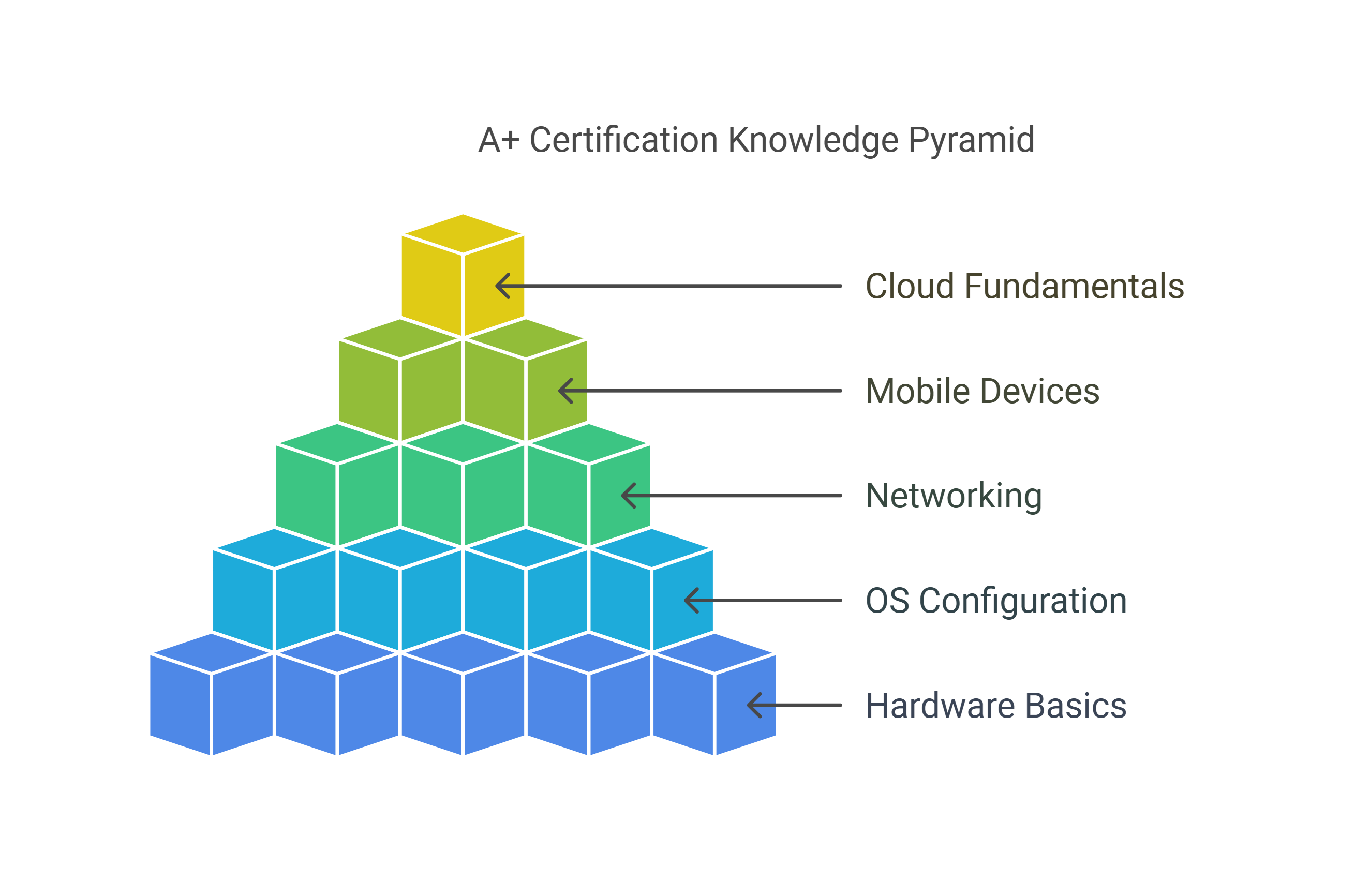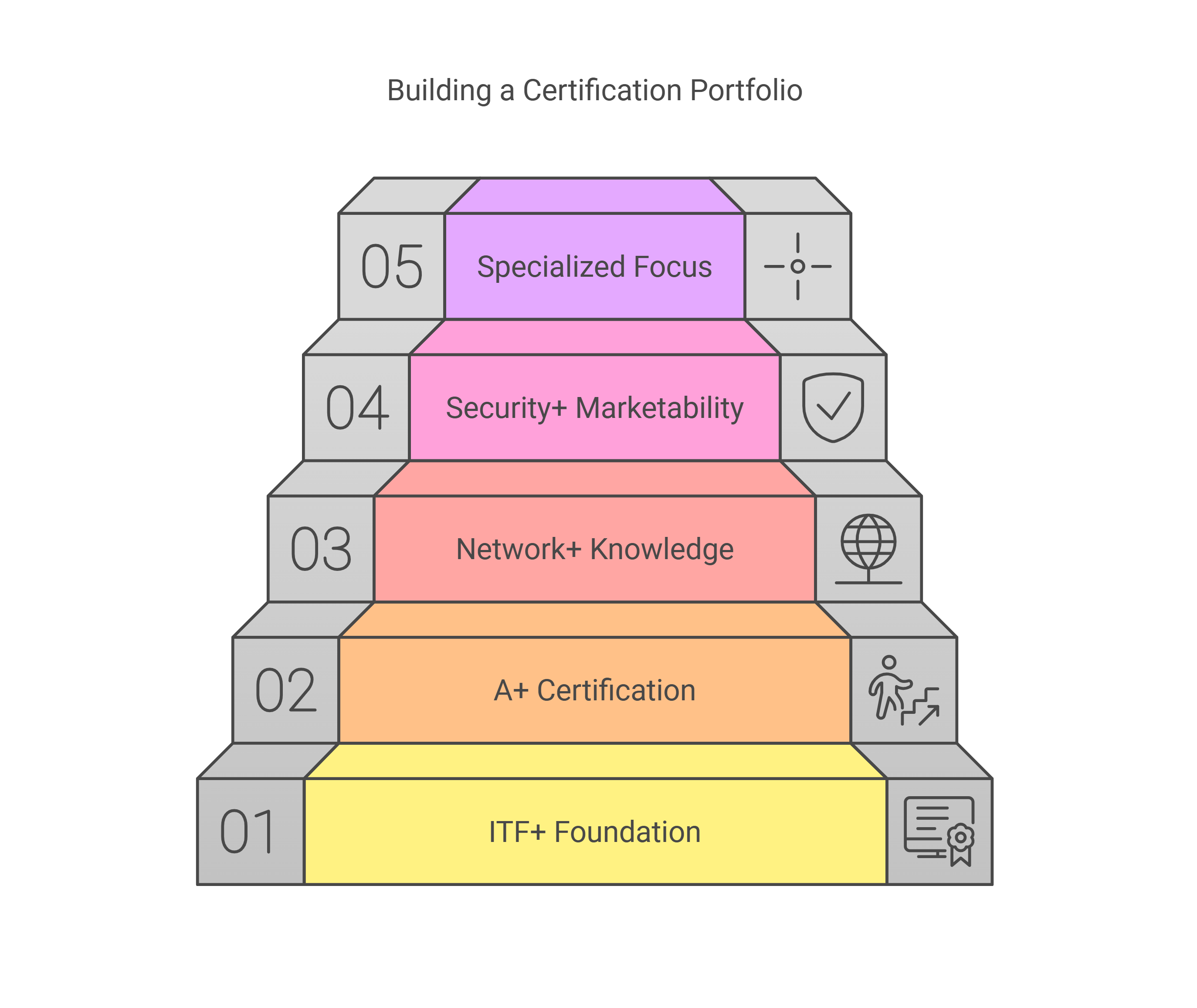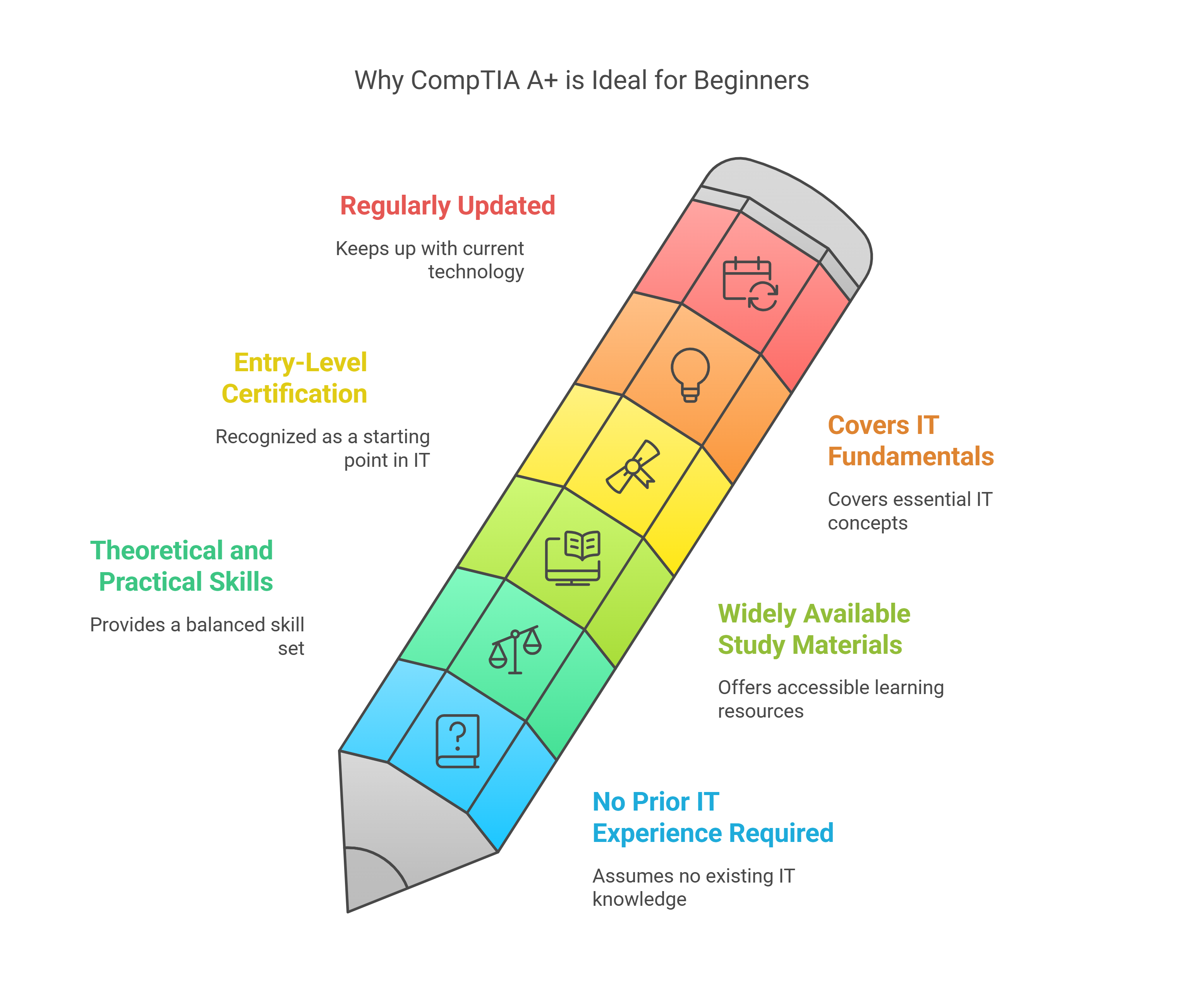
Break into Tech: Top Entry-Level Certifications That Actually Get You Hired
Are you ready to launch your IT career but feeling overwhelmed by the alphabet soup of certifications? You're not alone. The world of IT certifications can seem like a maze, but having the right roadmap makes all the difference. Let's explore the best entry-level certifications that can jumpstart your technology career.
Why Start with Certifications?
Before diving into specific certifications, it's important to understand their value. Certifications serve as industry-recognized proof of your skills, helping you stand out to employers and providing structured learning paths. They're especially valuable when you're just starting out and don't have extensive work experience.
Building Your Certification Foundation
Let's explore the most valuable entry-level certifications in order of typical progression:
CompTIA ITF+ (Information Technology Fundamentals+)
Think of ITF+ as your "IT 101" course. This certification is perfect if you're completely new to technology or coming from a non-technical background. It covers:
- Basic computing concepts
- Software and hardware fundamentals
- Basic security concepts
- Simple networking principles
The best part? The exam is relatively straightforward and builds confidence for more advanced certifications.
CompTIA A+
The A+ certification is widely considered the industry standard for starting an IT career. It's more comprehensive than ITF+ and covers:
- Hardware troubleshooting and maintenance
- Operating system installation and configuration
- Basic networking concepts
- Mobile device hardware
- Cloud computing fundamentals

A+ requires passing two exams, but the investment is worth it - many help desk and technical support positions list A+ as a requirement.
CompTIA Network+
Once you've mastered the basics, Network+ is a logical next step. This certification focuses on:
- Network infrastructure concepts
- Network operations
- Network security
- Network troubleshooting
- Network tools and documentation
Network+ can open doors to junior networking positions and provides essential knowledge for any IT career path.
CompTIA Security+
With cybersecurity becoming increasingly critical, Security+ has become almost as fundamental as A+. It covers:
- Network security concepts
- Compliance and operational security
- Threats and vulnerabilities
- Application, data, and host security
- Access control and identity management
- Cryptography basics
Security+ can lead to entry-level cybersecurity roles and adds significant value to any IT position.
Cisco CCT (Certified Technician)
The Cisco CCT serves as an entry point into the world of Cisco certifications. It comes in two flavors:
- CCT DataCenter
- CCT Routing & Switching
Either version provides:
- Hands-on experience with Cisco equipment
- Basic networking skills
- Fundamental troubleshooting abilities
- Understanding of Cisco's networking approach
Microsoft Technology Associate (MTA)
While Microsoft is phasing out MTA, its replacement fundamentals certifications are excellent for beginners:
- Azure Fundamentals (AZ-900)
- Microsoft 365 Fundamentals (MS-900)
- Security Fundamentals (SC-900)
These certifications provide solid groundwork for cloud computing and Microsoft technologies.
Strategy for Success
Consider this approach to building your certification portfolio:
1. Start with ITF+ only if you have zero technical background
2. Make A+ your first major certification goal
3. Follow with Network+ to build crucial networking knowledge
4. Add Security+ to make yourself more marketable
5. Choose specialized certifications based on your career interests

Time and Cost Considerations
Be strategic about your certification journey:
- Plan for 2-3 months of study per certification
- Budget $200-400 per exam (look for voucher deals)
- Use free resources like Professor Messer's videos
- Consider instructor-led training for more difficult certifications

Frequently Asked Questions
What is the first IT certification I should get?
If you have some basic tech knowledge, CompTIA A+ should be your first certification. It provides a comprehensive foundation in IT fundamentals and is widely recognized by employers. However, if you're completely new to technology, consider starting with CompTIA ITF+ to build basic knowledge before tackling A+.
Which IT certification is the easiest to get?
CompTIA ITF+ is generally considered the easiest IT certification to obtain. It covers basic concepts and requires less technical depth than other certifications. Cloud fundamentals certifications like Microsoft's AZ-900 are also relatively straightforward for beginners.
Which certification is best for IT fresher?
CompTIA A+ is the best certification for IT freshers (newcomers) because:
- It covers a broad range of fundamental IT concepts
- It's widely recognized by employers
- It's designed for entry-level positions
- It provides practical, hands-on knowledge
- Many help desk and support roles require or prefer it
Is CompTIA A+ good for beginners?
Yes, CompTIA A+ is excellent for beginners because:
- It assumes no prior IT experience
- It teaches both theoretical and practical skills
- Study materials are widely available
- It's designed as an entry-level certification
- It covers the fundamentals needed for most IT careers
- It's regularly updated to reflect current technology

Should I take A+ or Security+ first?
Most IT professionals should start with A+ before Security+ because:
- A+ provides fundamental IT knowledge that helps understand security concepts
- Security+ builds upon basic networking and hardware concepts covered in A+
- Many Security+ topics assume familiarity with general IT principles
- The natural progression is A+ → Network+ → Security+
- Employers typically expect this certification order
However, if you already have significant IT experience or are specifically targeting a security role and have a strong technical background, you might skip straight to Security+.
Is CompTIA Network+ for beginners?
Network+ is considered an intermediate-level certification. While it's still entry-level for networking specifically:
- It assumes basic IT knowledge covered in A+
- The concepts are more complex than A+ material
- You should have some familiarity with basic networking concepts
- Many successful candidates get A+ first
- Study time typically takes longer than A+
- The exam has a higher difficulty level than A+
For true beginners, it's recommended to start with ITF+ and then progress to A+ then Network+ and then Security+.
How much can I make with just a Security+ certification?
Salary ranges with Security+ certification vary based on:
- Geographic location
- Additional certifications and skills
- Work experience
- Industry sector
- Specific role
Typical salary ranges for Security+ certified professionals (as of 2024):
- Entry-level security roles: $45,000 - $60,000
- Help desk with security focus: $40,000 - $55,000
- Junior security analyst: $55,000 - $70,000
- System administrator with security focus: $60,000 - $75,000
Note that Security+ alone typically isn't enough for higher-paying cybersecurity positions. Most employers look for additional certifications, experience, or education for roles paying $80,000+.
Remember, certifications are just one part of your IT career journey. Combine them with hands-on practice, lab work, and continuous learning for the best results. Start with the basics, build a strong foundation, and then specialize based on your interests and career goals.
Mike G.
IT Certification Jump
 Add Row
Add Row  Add
Add 



